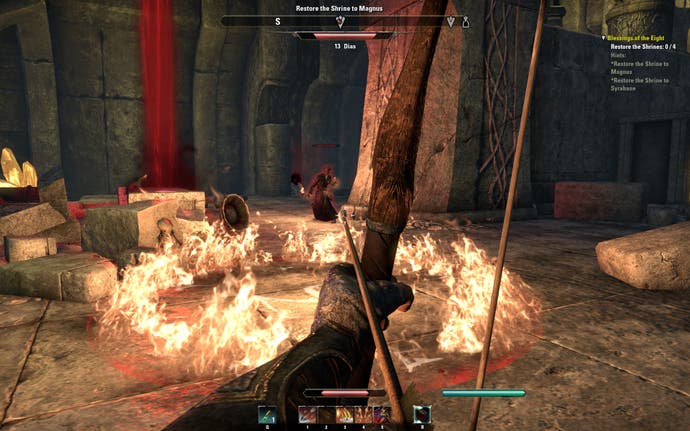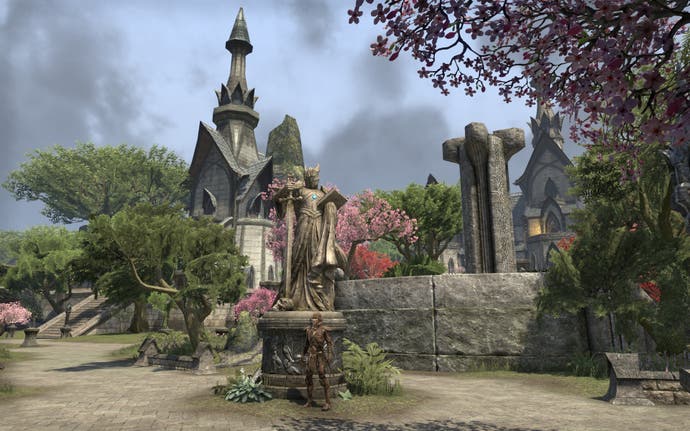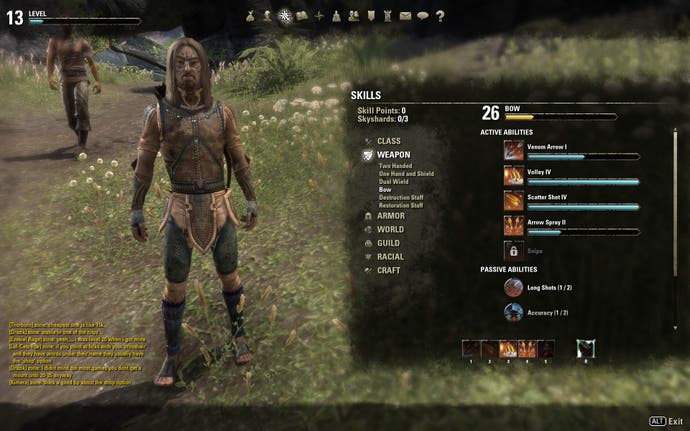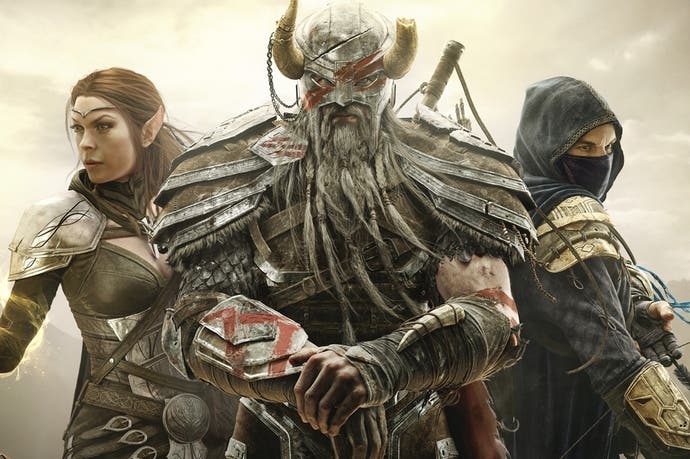The Elder Scrolls Online renounces the grind
But can you really have a traditional MMO without it?
Imagine a point almost exactly halfway between The Elder Scrolls 5: Skyrim and your traditional mainstream massively multiplayer RPG, for which the reference points are, in 2014, still the first EverQuest and World of Warcraft. This is where you will find The Elder Scrolls Online. I've spent around 20 hours in the beta. I have much still to discover, but my overwhelming impression is of equipoise - of a game balanced with conscientious, almost fearful care between the two things that it is trying to be.
Much has been made of The Elder Scrolls Online's identity crisis, but you can't really call it a crisis anymore. After sceptical fan feedback on early builds, Zenimax Online Studios, the developer created to make this game, has made a determined push to bring ESO more in line with the wildly popular series of solo role-players whose name it bears. The art style has been steered towards Bethesda's trademark muted realism and a convincing, useable first-person camera has been added. I don't know how much the content has changed, but it certainly now bears the Elder Scrolls imprimatur: longish, talky quest lines with a fondness for political intrigue or the hubris of mad mages. It looks, talks and walks like an Elder Scrolls game: prestige, high-minded high fantasy.
What Zenimax can't do, though, is go deep and change the foundations ESO is built on, which are very much those of the not-so-modern MMO. They consist of a giant, sturdy superstructure of long-form levelling, mixing solo questing, group dungeons and player-versus-player warfare, at the distant end of which await a level cap and a gear-progression endgame. Although not short of sheer acreage to explore, it is an essentially linear journey with a pace strictly governed by your character level. Wander into higher-level zones, if you even can, and you'll end up going nowhere in a hurry. This is a fundamentally different proposition from the flat, free-form structure that made the Elder Scrolls name, where with only a few exceptions you can explore the world, fight stuff, develop your character and follow storylines at your own whim.
Now, I'm not going to get into value judgements about these two paradigms, or damn Zenimax Online Studios out of hand for being conservative in its approach to MMOs. These arguments have been made before (persuasively by Richard Cobbett here on Eurogamer), and while mainstream MMOs are certainly in need of innovation, I can also understand that the stakes were too high in this case for Zenimax to embark on a wild jazz odyssey of formal experimentation - especially given the unfashionable demand that the game earn its keep with subscription fees. In many respects, the attempt to make peace between The Elder Scrolls Online's two influences is accomplished and admirable. But when you try to make one thing look like another thing, compromise is inevitable - and it can leave the game in some pretty strange places.
Let me illustrate what I mean by talking about questing, since this took the bulk of my time across the first 15 levels of the game. It's different from what you expect of an MMO (and in line with what you expect of Elder Scrolls) in two important respects, and on paper, they sound great.
The first is that - once out of the starting area, at any rate - you can't expect to be led by the nose to quests. The Elder Scrolls Online doesn't really do breadcrumb trails or "Christmas tree" quest hubs. Away from the game's main storyline, you really have to explore the map to find quests to take on. While these aren't dynamically different from what you'd expect - an archeological dig is infested with vengeful ghosts; pirates are marauding on the coast - they at least feel like situations arising organically from the landscape, and you feel a bit more like an adventurer and a bit less like a bike messenger.

It's a small freedom, but a pleasant one, and it causes only minor friction with the MMO format, in that you can easily find yourself outpacing your own level and wandering too far up the food chain. No matter; just go back and explore some more. Anyway, you soon get into the game's rhythm.
The second departure from MMO tradition is both more exciting and more problematic. There's no chaff. There's no grinding. You will very rarely, almost never, be asked to cull a certain number of an enemy population or farm them for quest drops. There are no fields full of placid monster livestock to churn through just because you feel like it, or want to make the next level in the shortest time. At early levels at any rate, enemies only crop up when there's a story reason for them to do so, and are more usually obstacles between you and your narrative goal rather than goals in themselves. Sounds great, right? None of that boring, rote stuff that MMO players and sceptics alike have been complaining about for decades.
The problem is, you can't make a change like this and expect the mechanical guts of your MMO to work smoothly when they're of such traditional design. ESO's balance - in terms of combat, levelling, economy - ends up out of whack because there just isn't enough stuff to kill. Experience is earned in lump sums every hour or so. Levelling slows to an unrewarding crawl, and gear progression with it. When the game steps up in difficulty, you haven't earned enough experience or gold (for the rather expensive consumables and armour repair bills) to be able to deal with it, and that slows you down even more.

Each quest is a rounded story, a neatly designed mini-saga of some 40 or 60 minutes' length, with a beginning, middle and end. They're not always inspired, but they're not perfunctory either. Yet their pacing is broken as they keep bumping up against the walls of numbers the game's MMO underpinnings erect in their path - numbers that, in the offline Elder Scrolls games, would invisibly adjust themselves out of the way.
This is not a game-breaking problem, and it is not an unfixable one either. Much of it, especially on the economy side, is a matter of tuning that will doubtless be undertaken through the beta and beyond launch. It's also true that we were playing on a rather underpopulated server, and overall progress may be faster and smoother in an environment where it's easier to take part in the game's multiplayer content - of which there appears to be plenty, in the form of Dark Anchor gates to take down, open public dungeons, elite monsters, and private instanced dungeons, not to mention the game's large-scale, three-way player-versus-player warfare (which wasn't available to test last weekend).
For many players, the promise of an MMO without padding will be worth the slightly slow and lumpy ride. Others - and I'm only a little sheepish to count myself among them - might find themselves missing the soothing monotony and steady-as-she goes progress of ESO's peers, whether it's World of Warcraft's hypnotic grind and refined item game, or Guild Wars 2's fast-paced rush of flowing multiplayer events. Grind is often used as a dirty word, but - whisper it - some of us enjoy it. More to the point, if a game is going to throw it out altogether, it will need to make deeper revisions to those MMO foundations than The Elder Scrolls Online does.

I should mention that not all of the game's compromises seem as awkward. Combat is a little rough, but fast-moving and free, and it uses a (rather vague) free aim rather than forcing you to lock onto your targets. As Richard noted in his preview last year, the role-playing system is quite open-ended and very promising, with your character class only dictating a handful of the many skill trees open to you, others stemming from things like equipment or guild affiliation. I can't yet determine how well this will work when multiplayer dynamics come to the fore in tougher dungeons - or when theorycrafting starts to dig out the most efficient builds - but for now it seems to offer a good balance of utility with the freedom to break out of imposed character templates.
As a big-budget attempt to reconcile a certain brand of solo role-playing with a massively multiplayer framework, The Elder Scrolls Online inevitably resembles one game above all others - Star Wars: The Old Republic. That game made compromises too, and in many ways successfully, but it still couldn't bear the range and weight of expectations - financial or otherwise - placed upon it. That's a worrying precedent for Zenimax Online Studios to consider. We'll find out in the coming months whether its strengthened bond to the 20-million-selling Skyrim can hook in one audience without alienating another. As always, it's a question of balance.






.png?width=291&height=164&fit=crop&quality=80&format=jpg&auto=webp)



